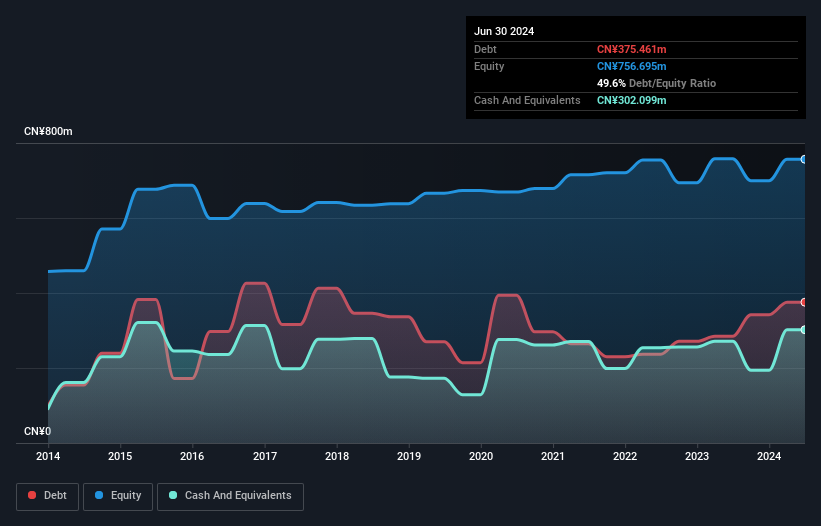- Hong Kong
- /
- Healthcare Services
- /
- SEHK:1110
Kingworld Medicines Group (HKG:1110) Takes On Some Risk With Its Use Of Debt

Howard Marks put it nicely when he said that, rather than worrying about share price volatility, 'The possibility of permanent loss is the risk I worry about... and every practical investor I know worries about.' When we think about how risky a company is, we always like to look at its use of debt, since debt overload can lead to ruin. Importantly, Kingworld Medicines Group Limited (HKG:1110) does carry debt. But should shareholders be worried about its use of debt?
Why Does Debt Bring Risk?
Debt is a tool to help businesses grow, but if a business is incapable of paying off its lenders, then it exists at their mercy. Part and parcel of capitalism is the process of 'creative destruction' where failed businesses are mercilessly liquidated by their bankers. However, a more usual (but still expensive) situation is where a company must dilute shareholders at a cheap share price simply to get debt under control. Of course, the upside of debt is that it often represents cheap capital, especially when it replaces dilution in a company with the ability to reinvest at high rates of return. When we examine debt levels, we first consider both cash and debt levels, together.
View our latest analysis for Kingworld Medicines Group
How Much Debt Does Kingworld Medicines Group Carry?
You can click the graphic below for the historical numbers, but it shows that as of June 2024 Kingworld Medicines Group had CN¥375.5m of debt, an increase on CN¥284.6m, over one year. However, because it has a cash reserve of CN¥302.1m, its net debt is less, at about CN¥73.4m.

How Strong Is Kingworld Medicines Group's Balance Sheet?
According to the last reported balance sheet, Kingworld Medicines Group had liabilities of CN¥574.7m due within 12 months, and liabilities of CN¥180.2m due beyond 12 months. On the other hand, it had cash of CN¥302.1m and CN¥206.5m worth of receivables due within a year. So its liabilities outweigh the sum of its cash and (near-term) receivables by CN¥246.3m.
This is a mountain of leverage relative to its market capitalization of CN¥312.4m. Should its lenders demand that it shore up the balance sheet, shareholders would likely face severe dilution.
We measure a company's debt load relative to its earnings power by looking at its net debt divided by its earnings before interest, tax, depreciation, and amortization (EBITDA) and by calculating how easily its earnings before interest and tax (EBIT) cover its interest expense (interest cover). This way, we consider both the absolute quantum of the debt, as well as the interest rates paid on it.
Kingworld Medicines Group has a low debt to EBITDA ratio of only 0.85. And remarkably, despite having net debt, it actually received more in interest over the last twelve months than it had to pay. So there's no doubt this company can take on debt while staying cool as a cucumber. In fact Kingworld Medicines Group's saving grace is its low debt levels, because its EBIT has tanked 24% in the last twelve months. When a company sees its earnings tank, it can sometimes find its relationships with its lenders turn sour. The balance sheet is clearly the area to focus on when you are analysing debt. But you can't view debt in total isolation; since Kingworld Medicines Group will need earnings to service that debt. So when considering debt, it's definitely worth looking at the earnings trend. Click here for an interactive snapshot.
But our final consideration is also important, because a company cannot pay debt with paper profits; it needs cold hard cash. So it's worth checking how much of that EBIT is backed by free cash flow. Looking at the most recent three years, Kingworld Medicines Group recorded free cash flow of 49% of its EBIT, which is weaker than we'd expect. That's not great, when it comes to paying down debt.
Our View
Neither Kingworld Medicines Group's ability to grow its EBIT nor its level of total liabilities gave us confidence in its ability to take on more debt. But the good news is it seems to be able to cover its interest expense with its EBIT with ease. We should also note that Healthcare industry companies like Kingworld Medicines Group commonly do use debt without problems. Taking the abovementioned factors together we do think Kingworld Medicines Group's debt poses some risks to the business. While that debt can boost returns, we think the company has enough leverage now. There's no doubt that we learn most about debt from the balance sheet. However, not all investment risk resides within the balance sheet - far from it. To that end, you should be aware of the 2 warning signs we've spotted with Kingworld Medicines Group .
If, after all that, you're more interested in a fast growing company with a rock-solid balance sheet, then check out our list of net cash growth stocks without delay.
If you're looking to trade Kingworld Medicines Group, open an account with the lowest-cost platform trusted by professionals, Interactive Brokers.
With clients in over 200 countries and territories, and access to 160 markets, IBKR lets you trade stocks, options, futures, forex, bonds and funds from a single integrated account.
Enjoy no hidden fees, no account minimums, and FX conversion rates as low as 0.03%, far better than what most brokers offer.
Sponsored ContentValuation is complex, but we're here to simplify it.
Discover if Kingworld Medicines Group might be undervalued or overvalued with our detailed analysis, featuring fair value estimates, potential risks, dividends, insider trades, and its financial condition.
Access Free AnalysisHave feedback on this article? Concerned about the content? Get in touch with us directly. Alternatively, email editorial-team (at) simplywallst.com.
This article by Simply Wall St is general in nature. We provide commentary based on historical data and analyst forecasts only using an unbiased methodology and our articles are not intended to be financial advice. It does not constitute a recommendation to buy or sell any stock, and does not take account of your objectives, or your financial situation. We aim to bring you long-term focused analysis driven by fundamental data. Note that our analysis may not factor in the latest price-sensitive company announcements or qualitative material. Simply Wall St has no position in any stocks mentioned.
About SEHK:1110
Kingworld Medicines Group
An investment holding company, primarily engages in the distribution and sale of branded imported pharmaceutical and healthcare products.
Excellent balance sheet, good value and pays a dividend.
Market Insights
Community Narratives



